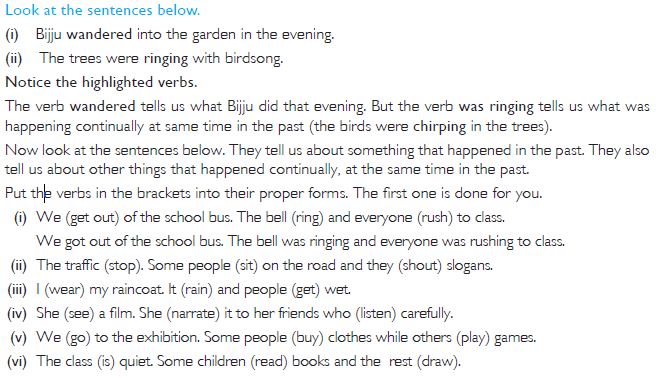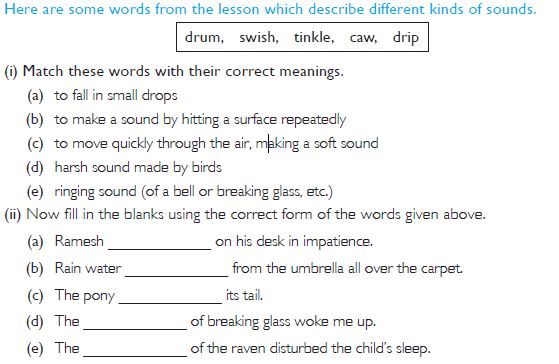Question 1:
Complete the following sentences.
(I) Bijju is not seen but his voice is heard because ____________
Answer:
of the mist
Question 2:
Complete the following sentences.
The writer describes the hill station and valley as ____________
Answer:
“a paradise that might have been.”
Question 3:
Complete the following sentences. The leopard was successful in ____________ but had to flee when ____________
Answer:
lifting a dog, Bijju’s mother approached screaming curses.
Question 4:
Complete the following sentences.
The miniverts are easily noticed because ____________
Answer:
they shine like brilliant jewels.
Question 5:
Complete the following sentences.
It looks like a fashion display on the slopes when ____________
Answer:
colourful wild dahlias come out of the rocky crevices
Question 5:
Complete the following sentences.
During monsoon season, snakes and rodents are found in roofs and attics because____________
Answer:
their holes and burrows are flooded with the rain water
Question 6:
Now fill in the blanks using the correct form of the words given.
(drum, swish, tinkle, caw, drip) Ramesh _____________ on his desk in impatience.
Answer:
is drumming
Question 7:
Now fill in the blanks using the correct form of the words given.
(drum, swish, tinkle, caw, drip) Rain water _____________ from the umbrella all over the carpet.
Answer:
is dripping
Question 7:
Now fill in the blanks using the correct form of the words given.
(drum, swish, tinkle, caw, drip) The pony _____________ its tail.
Answer:
is swishing
Question 8:
Now fill in the blanks using the correct form of the words given. (drum, swish, tinkle, caw, drip) The _____________ of breaking glass woke me up.
Answer:
tinkling
Question 9:
Now fill in the blanks using the correct form of the words given. (drum, swish, tinkle, caw, drip) The _____________ of the raven disturbed the child’s sleep.
Answer:
cawing
Question 10:

Answer:
sure enough
Question 11:

Answer:
big enough
Question 12:

Answer:
colourful enough
Question 13:

Answer:
brave enough
Question 14:

Answer:
anxious enough
Question 15:

Answer:
kind enough
Question 16:

Answer:
serious enough
Question 17:

Answer:
foolish enough
Question 17:

Answer:
fair enough
Question 18:
Why is the author not able to see Bijju?
Answer:
The author is not able to see Bijju because of the mist.
Question 19:
What are the two ways in which the hills appear to change when the mist comes up?
Answer:
When the mist comes, the birds become silent. Not only does the mist conceal the hills, it blankets them in silence too.
Question 20:
When does monsoon season begin and when does it end? How do you prepare to face the monsoon?
Answer:
Monsoon starts in the month of June. It ends in the first week of October. We buy umbrellas and raincoats to face the monsoon.
Question 21:
Which hill station does the author describe in this diary entry?
Answer:
The author mentions (hill station) Mussoorie in this diary entry.
Question 22:
For how many days does it rain without stopping? What does the author do on these days?
Answer:
It rains without stopping for eight or nine days. The author has nowhere to go. He stays in the room and looks out of the window at the umbrellas.
Question 23:
Where do the snakes and rodents take shelter? Why?
Answer:
The snakes and rodents take shelter in roofs, attics and godowns. They do so because their holes and burrows are flooded with rain water.
Question 24:
What did the author receive in the mail?
Answer:
The author received a cheque in the mail.
Question 25:
Look carefully at the diary entries for June 24-25, August 2 and March 23. Now write down the changes that happen as the rains progress from June to March.
Answer:
On June 24 the monsoon mist covers the hills and blankets them in silence. June 25 brings genuine early monsoon rain. On August 2, the rain is on its full swing. March 23 sees the end of winter and rainbow appears in the sky after a heavy hailstorm.
Question 27:
Why did the grandmother ask the children not to kill the Chuchundar?
Answer:
The grandmother asked the children not to kill the Chuchundar because they were considered lucky and they brought money.
Question 28:
What signs do we find in Nature which show that the monsoons are about to end?
Answer:
The seeds of the Cobra Lily turn red which shows that the monsoons are about to end.
Question 29:
‘Although tin roofs are given to springing unaccountable leaks, there is a feeling of being untouched by, and yet in touch with, the rain.’
(i) Why has the writer used the word, ‘springing’?
(ii) How is the writer untouched by the rain?
(iii) How is the writer in touch with the rain at the same time?
Answer:
(i) The writer has used the word ‘springing’ because the water is leaking with a speed through the tin roofs.
(ii) Writer is untouched by the rain as he is in his room.
(iii) The writer is in touch with the rain as he is enjoying the sound of the rainfall on the tin roofs.
Question 30:
Mention a few things that can happen when there is endless rain for days together?
Answer:
The sun does not appear for days together. Everything is damp and soggy. One cannot go out. One can just stay in the room and look at the outside scene through the window. The hill sides are lush. The flowers begin to appear.
Question 31:
What is the significance of cobra lily in relation to the monsoon season, its beginning and end?
Answer:
When cobra lily emerges, it marks the beginning of the monsoon season. When its seeds turn red, it means the monsoon season is coming to an end.
Question 32:
Here are some words that are associated with the monsoon. Add as many words as you can to this list. Can you find words for these in your languages ?

Answer:
(i) lightning,
(ii) thunder,
(iii) rainbow,
(iv) raincoat,
(v) storm,
(vi) rainfall
Question 33:

Answer:
(i) got out, was ringing, was rushing.(ii) stopped, were sitting, were shouting.
(iii) wore, was raining, were getting.
(iv) saw, was narrating, were listening.
(v) went, were buying, were playing.
(vi) was quiet, were reading, were drawing.
Question 34:
Do you believe in superstitions? Why, or why not? Working with your partner, write down three superstitious beliefs that you are familiar with...
Answer:
I don’t believe in superstitions because they make us weak and coward. The three superstitious beliefs are :(i) over boiling of milk
(ii) sitting of crow on one’s head
(iii) weeping of dog
Question 34:
Do you believe in superstitions? Why, or why not? Working with your partner, write down three superstitious beliefs that you are familiar with...
Answer:
I don’t believe in superstitions because they make us weak and coward. The three superstitious beliefs are :(i) over boiling of milk
(ii) sitting of crow on one’s head
(iii) weeping of dog
Question 35:
The monsoons are a time of great fun and even a few adventures: playing in the rain and getting wet, wading through knee-deep water on your way to school, water flooding the house or the classroom, powercuts and so on. Write a paragraph describing an incident that occurred during the rains which you can never forget.
Answer:
It was the month of August. It was raining heavily. It was also time for my school. I waded through knee-deep water on my way to school. It kept raining throughout the day. When the last bell rang,the rain stopped. The clouds began to break up. On our way back home, we saw a small puppy struggling to come out of a ditch in which it had fallen. I helped the puppy out of ditch. Though my clothes were spoiled, but I was happy because I saved a life. Left in the ditch, the puppy would have died.
Question 36:

Answer:
(i) (a) drip (b) drum (c) swish (d) caw (e) tinkle.
(ii) (a) is drumming (b) is dripping (c) is swishing (d) tinkling (e) cawing.
Question 37:
Add-ly to each of the following adjectives, then use them to fill in the blanks. (perfect, near, kind, pleasant, eager) Why didn’t you turn up at the meeting ? We all were____________ waiting for you.
Answer:
eagerly
Question 38:
Add-ly to each of the following adjectives, then use them to fill in the blanks. (perfect, near, kind, pleasant, eager) ____________ write your name and address in capital letters.
Answer:
kindly
Question 39:
Add-ly to each of the following adjectives, then use them to fill in the blanks. (perfect, near, kind, pleasant, eager) I was ____________ surprised to see him at the railway station. I thought he was not coming.
Answer:
pleasantly
Question 40:
Add-ly to each of the following adjectives, then use them to fill in the blanks. (perfect, near, kind, pleasant, eager) It is ____________ believable that I am not responsible for this mess.
Answer:
perfectly
Question 41:
Add-ly to each of the following adjectives, then use them to fill in the blanks. (perfect, near, kind, pleasant, eager) He fell over the step and ____________ broke his arm.
Answer:
nearly
Question 42:
Complete each sentence below using the appropriate form of the verbs in brackets. I ________ (phone) you when I ________ (get) home from school.
Answer:
shall phone, get
Question 43:
Complete each sentence below using the appropriate form of the verbs in brackets. Hurry up ! Madam ________ (be) annoyed if we ________ (be) late.
Answer:
will be annoyed, are
Question 44:
Complete each sentence below using the appropriate form of the verbs in brackets. If it ________ (rain) today, we ________ (not) go to the play.
Answer:
rains, shall not
Question 45:
Complete each sentence below using the appropriate form of the verbs in brackets. When you ________ (see) Mandal again, you ________ (not/recognise) him. He is growing a beard.
Answer:
see, will not recognise
Question 46:
Complete each sentence below using the appropriate form of the verbs in brackets. We are off today. We ________ (write) to you after we ________ (be) back.
Answer:
shall write, are.
